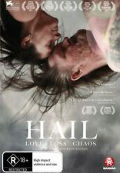
Directed by
Amiel Courtin-Wilson
104 minutes
Rated MA
Reviewed by
Bernard Hemingway


Hail
Synopsis: Danny (Daniel P. Jones) returns home to his partner, Leanne (Leanne Campbell), after a stretch in prison. He would like to go straight but that takes will-power and Danny is soon back to his old ways.
I wasn’t too taken with Amiel Courtin-Wilson’s 2008 documentary, Bastardy, and even less so with his 2010 portrait of singer-songwriter Ben Lee, Ben Lee: Catch My Disease, both of which seemed to me to take a soft pedal approach to their subject matter. So I was ready to be underwhelmed by Hail, the director’s debut fiction feature. Boy, was I surprised!
Hail is an extraordinary film, one that is brutally raw and brilliantly realized. Most Australian films, indeed most films in general, adhere to a time-worn set of seamless conventions that ultimately conspire to distance themselves from their audience. Realistic films such as Animal Kingdom or Snowtown, try to overcome that, but we are always more or less aware that the combination of script, performance, cinematography, editing and so on have been employed to fabricate a consumer object of an readily identifiable genre and style. Well you can forget that with Courtin-Wilson's film. Imagine that he cut a transverse section out of Snowtown, put it under a microscope, filtered and refracted it, then blew it up to oversized proportions and you might have some idea of the viewing experience that you are in for with Hail. But don’t worry, whilst it is arthouse it is not just ART. There’s story, character and real heart here. Hail is a real film, just not one as you know it.The story was based on the recorded memoirs of drug addict and thief Daniel P. Jones. Whilst Courtin-Wilson’s portrait of Jack Charles in Bastardy played up to its subject’s roguish charm, Hail is painfully, confrontingly frank about its protagonist’s shiftless, dishonest, abusive character. Full credit must go to Jones himself for his honest self-revelation, both as an autobiographer and a performer. He may not be a great actor but plays himself probably better than any professional actor could. Equally, opposite him, his real-life partner, Leanne Letch, is remarkable for the naturalness of her performance. If you can recall the kitchen round table scenes in Snowtown and you took one of the couples from it and followed them home, this is what you might get. It’s crude and it’s scary. Sometimes the ugliness gets so intense that Courtin-Wilson pulls out of it for us, switching off the dialogue and substituting Steve Benwell’s score whilst leaving the visuals running.
This combination of realist story and formal manipulation is very much a part of what makes Hail so extraordinary. Courtin-Wilson gradually infuses his relatively straightforward narrative with a variety of hallucinatory aural and imagistic treatments (Robert Mackenzie’s sound design and Rebecca Dunn’s post-production visual effects deserve mention here in addition to Courtin-Wilson’s and Germain McMicking’s cinematography) culminating in a surreal scene of a horse (a horse carcass, actually, but no less discomfiting for that) falling to earth after having been thrown from an aeroplane. At times these purely filmic devices are perhaps a little too distorting as with a scene in the latter part of the film which initially I thought was a rape but which then inexplicably seemed to go in the opposite direction. On the other hand, from a purely pragmatic point of view I wondered how Danny managed to financially support himself as he seemed remarkable well provided for with cars. These are, however, minor reservations.
As a consumer object this film is not going to find a lot of endorsement, but as a filmic object, it is without peer in Australian cinema. If this distinction means anything to you, you must see Hail.
Show detailed review
Want something different?





